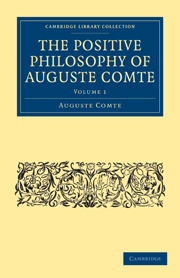CHAPTER V - ORGANIC CHEMISTRY
Published online by Cambridge University Press: 29 August 2010
Summary
Confusion of two kinds of fact
Organic Chemistry comprehends, it cannot be denied, two kinds of researches, chemical and physiological, which are perfectly distinct. For instance, the study of organic acids, and especially the vegetable acids, and alcohol, ethers, etc., has a character as purely chemical as that of any inorganic substances whatever; and, on the other hand, there is no doubt of the biological character of inquiries into the composition of sap or blood, and of the analysis of the products of respiration, and many other matters included in organic chemistry. The confusion of the two orders is prejudicial to both sciences, and especially to physiology. The division of Chemistry conceals or violates essential analogies, and hinders the extension of dualism into the organic region, where it is seldom found, though, as I have shown, it is optional, in fact, throughout the whole range of chemistry; and thus the arbitrary arrangement is the chief obstacle in the way of the entire generalization of the doctrine of definite proportions. And whenever a true chemical theory shall fitly replace the anti-phlogistic conception, it must necessarily comprehend all organic, as well as inorganic compounds. The most philosophical chemists are tending more and more to a recognition of the identity of the two departments; and there can be no doubt that the establishment of that identity will be an immediate consequence of a rational classification of chemical knowledge.
- Type
- Chapter
- Information
- The Positive Philosophy of Auguste Comte , pp. 346 - 355Publisher: Cambridge University PressPrint publication year: 2009First published in: 1853

